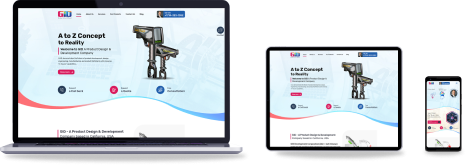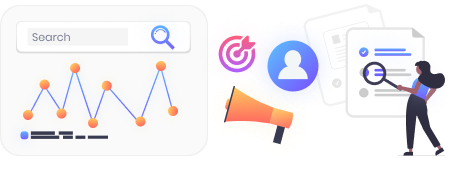
Why Investing in Web and App Development is Essential for Business Growth
The Digital Revolution and Business Transformation
The rapid technological advancements over the past few decades have reshaped the business landscape dramatically. With the advent of the internet, mobile devices, and cloud computing, businesses have experienced unprecedented changes in how they operate, engage with customers, and compete in the marketplace. This digital revolution has not only streamlined processes but has also opened up new avenues for innovation and growth. In today’s digital age, a strong online presence has become indispensable. Businesses that fail to adapt risk losing relevance, as consumers increasingly turn to digital platforms for their shopping and information needs.
A robust online presence allows companies to reach a wider audience, engage with customers more effectively, and build brand loyalty. As consumers expect seamless digital experiences, businesses must prioritize their visibility across various online platforms. This is where web and app development play a crucial role, acting as the backbone of a successful digital strategy.
Defining Web and App Development
Web development refers to the process of creating websites and applications that function over the internet. It encompasses a range of tasks, including web design, web content development, client-side/server-side scripting, and network security configuration. On the other hand, app development focuses on building software applications that run on mobile devices or desktops, either natively or through the web.
While both web and app development are essential for modern businesses, they serve different purposes. Web development typically targets a broader audience through websites that are accessible on various devices. In contrast, app development is often more tailored, providing specific functionalities that enhance user experience on mobile devices or desktops. Together, these forms of development work synergistically to strengthen a business’s digital footprint.
The Business Benefits of Investing in Web and App Development
Investing in web and app development offers numerous advantages that can significantly contribute to business growth. One of the primary benefits is enhanced brand visibility. A well-designed website and a user-friendly app increase the likelihood that potential customers will find a business online. This visibility not only helps attract new customers but also retains existing ones by providing them with a convenient platform to engage with the brand.
Improved customer engagement is another key advantage. With effective web and app development, businesses can offer personalized experiences, gather feedback, and facilitate direct communication with their audience. This two-way interaction builds trust and fosters a loyal customer base.
Additionally, a strong digital presence can lead to increased sales. A well-optimized website and an engaging app make it easier for customers to browse products, complete purchases, and access support. The convenience of digital shopping often translates to higher conversion rates, directly impacting revenue.
Operational efficiency is also enhanced through strategic web and app development. By automating processes and integrating digital solutions, businesses can reduce manual workloads and streamline operations. This efficiency not only saves time but also minimizes errors, allowing teams to focus on core business objectives.
Read Also: Empowering Your Online Presence with Cutting-Edge Technologies
For those looking to establish or improve their online presence, it is crucial to hire a development team or website designer skilled in both web and app development. Such professionals can tailor solutions to meet specific business needs, ensuring that the digital platforms effectively support growth and engagement.
In summary, the digital revolution has transformed the way businesses operate, making web and app development essential for success. By understanding the nuances of these technologies and investing in them wisely, businesses can enhance their brand visibility, improve customer engagement, increase sales, and achieve greater operational efficiency. As the digital landscape continues to evolve, the importance of these developments will only grow, positioning them as pivotal elements in any forward-thinking business strategy.
The Power of Web Development
Building a Strong Online Presence
In the digital age, having a strong online presence is no longer optional for businesses; it is a necessity. At the heart of this presence lies a well-designed and optimized website. A professional website acts as a brand’s digital storefront, showcasing products and services while communicating the company’s values and identity. The importance of investing in web and app development cannot be overstated, as it directly influences how customers perceive a brand.
A well-structured website enhances user experience, making it easy for visitors to navigate and find the information they seek. Factors like layout, color schemes, and typography all play crucial roles in creating an engaging interface. When a website is visually appealing and easy to use, it not only attracts new visitors but also retains them, encouraging them to explore further. A high-quality website can lead to increased engagement, longer visit durations, and ultimately higher conversion rates.
Moreover, a professional website can differentiate a business from its competitors. In a crowded marketplace, having a unique and functional website can set a brand apart, making it more memorable to potential customers. This differentiation is essential for building brand loyalty and encouraging repeat visits. Therefore, investing in web and app development should be a top priority for any business aiming for success in the digital landscape.
SEO and Digital Marketing Integration
An optimized website is integral to improving visibility and driving organic traffic. This is where Search Engine Optimization (SEO) comes into play. SEO encompasses a range of strategies designed to enhance a website’s visibility in search engine results. A website that is optimized for SEO is more likely to attract potential customers searching for relevant products or services.
The role of SEO in web and app development is critical. Businesses must incorporate SEO best practices into the development process from the outset. This includes keyword research, on-page optimization, and technical SEO, all of which contribute to a website’s ability to rank higher in search engine results. Utilizing relevant keywords throughout the website’s content, titles, and meta descriptions can significantly improve its chances of appearing on the first page of search results.
Additionally, web development can be optimized for SEO through structural elements. A well-organized site hierarchy, clean URL structures, and fast loading speeds all contribute to better user experience and improved SEO rankings. By ensuring that a website is responsive and mobile-friendly, businesses can further enhance its visibility, as search engines prioritize sites that offer optimal experiences across devices.
Integrating digital marketing efforts with SEO can amplify these results. Social media campaigns, email marketing, and content marketing can drive traffic back to the website, further enhancing its visibility and credibility. By leveraging multiple channels, businesses can create a cohesive strategy that maximizes the impact of their web and app development initiatives.
Hire Web And App Developers?
Contact Us Today!E-commerce and Online Sales
The rise of e-commerce has transformed the way businesses sell products and services. E-commerce websites offer an unparalleled opportunity to generate revenue by reaching a global audience. The potential for increased sales through online channels makes investing in web and app development for e-commerce platforms essential.
An effective e-commerce site is not only visually appealing but also functional. It must provide customers with easy navigation, comprehensive product descriptions, high-quality images, and seamless checkout processes. These features are critical for encouraging purchases and minimizing cart abandonment. By investing in user-centric web and app development, businesses can create an online store that not only attracts visitors but also converts them into customers.
Security is another vital aspect of e-commerce. Customers need to feel confident that their personal and financial information is safe when making online purchases. A secure online store employs SSL certificates and secure payment gateways, which help build trust with consumers. When customers feel secure, they are more likely to complete their purchases and return for future transactions.
In addition to security, offering personalized shopping experiences can enhance customer satisfaction. Tailored recommendations based on browsing history and preferences can make the shopping experience more engaging. This personalization can be facilitated through effective e-commerce web and app development, allowing businesses to create dynamic and user-friendly interfaces.
Content Marketing and Lead Generation
A well-developed website serves as an ideal platform for content marketing and lead-generation. High-quality content can attract visitors, provide value, and position a business as an authority in its field. Blogs, articles, videos, and infographics can be strategically utilized to engage users and drive traffic to the website.
Content marketing is vital for generating leads. By creating valuable and informative content, businesses can capture the interest of potential customers, guiding them through the sales funnel. Incorporating clear calls to action (CTAs) within content can prompt users to take desired actions, such as subscribing to newsletters, downloading guides, or requesting more information.
Integrating content marketing with web and app development can significantly enhance lead generation efforts. A website designed to facilitate content distribution will ensure that users can easily access, share, and interact with valuable resources. This not only improves user engagement but also increases the likelihood of converting visitors into leads.
Furthermore, leveraging analytics tools to track the performance of content marketing initiatives can provide valuable insights. By understanding which types of content resonate most with their audience, businesses can refine their strategies, leading to improved engagement and higher conversion rates.
As businesses develop their content marketing strategies, it’s essential to ensure that the website can support these efforts. This includes optimizing load times for content-heavy pages, ensuring mobile compatibility, and maintaining a clean design that enhances readability.
By prioritizing web and app development in conjunction with content marketing, businesses can create a robust online presence that not only attracts visitors but also fosters lasting relationships with customers.
Overall, the power of effective web and app development extends far beyond creating a digital presence; it encompasses building a dynamic, user-friendly platform that supports SEO, e-commerce, and content marketing initiatives. Through strategic investment in these areas, businesses can drive growth, enhance customer engagement, and achieve sustainable success in the digital marketplace.
Also Read: Hybrid Mobile Application Development with ASP.NET MVC
The Mobile Advantage: App Development
The Mobile-First Era
In today’s digital landscape, the reliance on mobile devices for accessing the internet has reached unprecedented levels. According to recent statistics, over half of all global web traffic now comes from mobile devices, a trend that underscores the importance of mobile-friendly solutions. As consumers increasingly use smartphones and tablets for everything from shopping to social media, businesses must adapt to this shift. This is where web and app development becomes crucial.
Having a mobile app is no longer a luxury. it is a necessity for businesses aiming to engage with their customers effectively. A mobile app provides direct access to users and enables businesses to deliver personalized experiences, making it easier to build brand loyalty. Moreover, mobile apps can significantly enhance a brand’s visibility, as they are often found in app stores, making them discoverable to a wider audience.
Apps also offer unique functionalities that websites cannot fully replicate, such as offline access, push notifications, and location-based services. These features can drive user engagement and enhance customer experiences. Therefore, investing in web and app development is essential for businesses that want to stay competitive in this mobile-first era.
Native vs. Hybrid Apps
When it comes to app development, businesses face a choice between native and hybrid apps, each with its pros and cons. Native apps are developed specifically for one platform, such as iOS or Android, using platform-specific programming languages. This approach allows for optimal performance and access to device features, resulting in a smoother user experience.
However, native app development can be resource-intensive and time-consuming, as it requires separate codebases for each platform. This can lead to increased costs and longer development timelines. Additionally, maintaining multiple versions of the app can complicate updates and feature additions.
On the other hand, hybrid apps are built using web technologies and can run on multiple platforms with a single codebase. This can make them more cost-effective and quicker to develop. However, hybrid apps may not perform as well as native apps and may lack access to certain device features.
When deciding between native and hybrid app development, businesses should consider their target audience, budget, and specific functionalities needed. If a company aims to provide a highly optimized user experience with advanced features, native development might be the best route. Conversely, if speed and cost-effectiveness are priorities, hybrid development can be an effective solution. In either case, web and app development is integral to creating a successful mobile presence.
Read Also: What’s Good For Your eCommerce Website Development?
Mobile App Features for Business Growth
Mobile apps can incorporate a variety of features that contribute to business growth and customer engagement. Some essential features include push notifications, in-app purchases, and loyalty programs.
Push notifications allow businesses to communicate directly with users, providing updates, offers, and reminders. This feature keeps the brand at the forefront of users’ minds and encourages them to engage with the app regularly. For instance, a retail app might send a notification about a flash sale, prompting users to make immediate purchases.
In-app purchases offer another avenue for generating revenue. Businesses can monetize their apps through direct sales of products, services, or premium features. This seamless integration of shopping within the app creates a user-friendly experience that can significantly boost sales.
Loyalty programs can also be integrated into mobile apps, enhancing customer retention. By rewarding users for their purchases or engagement, businesses can foster brand loyalty. For example, a coffee shop app might offer points for every purchase, which users can redeem for free drinks. This not only drives sales but also encourages repeat visits.
These features are just a few examples of how web and app development can enhance customer engagement and drive business growth. By focusing on creating an app that meets user needs and preferences, businesses can build a loyal customer base and increase their revenue.
Mobile App Security and Privacy
With the rise of mobile apps comes the critical issue of data security and privacy. As businesses collect sensitive user information, ensuring that this data is protected is paramount. Breaches can result in significant financial losses and damage to a company’s reputation.
Best practices for protecting user data should be integral to any web and app development strategy. This includes implementing strong encryption methods to safeguard data transmission and storage. Additionally, businesses should regularly update their apps to patch vulnerabilities and ensure that security protocols are current.
User authentication is another vital aspect of app security. Implementing multi-factor authentication can add an extra layer of protection, ensuring that only authorized users can access sensitive information. Businesses should also provide clear privacy policies, informing users about how their data will be used and stored.
Furthermore, it is crucial to ensure compliance with relevant regulations, such as the General Data Protection Regulation (GDPR) in Europe or the California Consumer Privacy Act (CCPA) in the United States. Compliance not only protects user data but also builds trust with customers, which is essential for fostering loyalty and engagement.
When businesses hire a website designer or app developer, they should prioritize those who understand the importance of security and privacy in mobile app development. By choosing partners who prioritize these elements, companies can mitigate risks and create a safer environment for their users.
Also Read: Quality Healthcare App Development in India at Concept Infoway
Why Choose Concept Infoway for Web and App Development
Our Expertise and Experience
At Concept Infoway, our extensive experience in the web and app development industry sets us apart from the competition. With over a decade of delivering innovative solutions, we have honed our skills to provide top-tier services that meet the diverse needs of our clients. Our team comprises highly skilled professionals who are experts in various facets of web and app development, including front-end and back-end development, UI/UX design, and mobile application development. This wealth of expertise allows us to tackle projects of any scale and complexity, ensuring that we can bring our client’s visions to life effectively.
Our Client-Centric Approach
What truly distinguishes Concept Infoway is our commitment to a client-centric approach. We believe that understanding our client’s needs is paramount to delivering tailored solutions that drive success. From the initial consultation to project completion, we engage closely with our clients to ensure their goals are met. This collaborative approach to project management fosters open communication and transparency, allowing us to adapt to changing requirements and ensure that the end product aligns perfectly with the client’s vision.
Our dedication to customization means that we don’t offer one-size-fits-all solutions. Instead, we take the time to understand each client’s unique challenges and objectives, which enables us to design web and app development strategies that are specifically tailored to achieve desired outcomes.
State-of-the-Art Technology
In the fast-evolving world of web and app development, staying ahead of industry trends is essential. At Concept Infoway, we pride ourselves on our use of the latest technologies and tools. We continuously invest in upgrading our skills and resources to ensure that we deliver cutting-edge solutions. Whether it’s utilizing advanced frameworks, integrating artificial intelligence, or implementing robust security measures, our team leverages state-of-the-art technology to enhance the functionality and performance of our projects.
Our commitment to innovation allows us to not only meet current industry standards but also set new benchmarks in web-based development. This proactive approach ensures that our clients benefit from the most advanced and efficient solutions available.
Quality Assurance and Testing
Quality assurance is a cornerstone of our web and app development process. We implement rigorous testing protocols at every stage of development to ensure that our deliverables are of the highest quality. Our testing processes cover functionality, performance, security, and usability, allowing us to identify and resolve any issues before launch.
We are committed to delivering bug-free and user-friendly solutions that enhance the user experience. Our quality assurance team meticulously reviews each project, ensuring that every detail meets our stringent standards. This dedication to quality not only minimizes post-launch issues but also enhances client satisfaction and trust.
Post-Development Support and Maintenance
At Concept Infoway, our relationship with clients does not end at project delivery. We understand that ongoing support and maintenance are crucial for the long-term success of any application. Our post-development services are designed to ensure that our clients can operate smoothly and efficiently after launch.
We offer comprehensive maintenance packages that include regular updates, performance monitoring, and troubleshooting. This commitment to support means that clients can focus on their core business activities, knowing that their web and app development solutions are in capable hands. Our goal is to foster long-term partnerships, helping our clients succeed in their endeavors.
In conclusion, choosing Concept Infoway for your web and app development needs ensures you receive unparalleled expertise, a client-centric approach, state-of-the-art technology, rigorous quality assurance, and ongoing support. We are dedicated to empowering businesses to thrive in the digital landscape, making us the ideal partner for your next project.
Conclusion
In today’s digital age, web and app development has become an indispensable tool for businesses of all sizes. By embracing these technologies, businesses can unlock a world of opportunities and drive sustainable growth.
A well-designed website and mobile app can significantly enhance brand visibility, improve customer engagement, and boost sales. By optimizing websites for search engines and leveraging the power of social media, businesses can attract a larger audience and increase their online presence.
Furthermore, e-commerce platforms and mobile apps enable businesses to reach a global customer base and streamline operations. By automating tasks, reducing costs, and improving customer satisfaction, web and app development can help businesses achieve a competitive edge.
As we move forward into 2024, investing in web development should be a top priority for businesses seeking to thrive in the digital landscape. By partnering with a reputable software development agency or software development firm, businesses can leverage the expertise of skilled developers to create innovative and effective digital solutions.
Frequently Asked Questions – FAQs
How do I get into web and app development?
To get into web and app development, start by learning programming languages like HTML, CSS, JavaScript, and backend languages like PHP or NET. Mobile frameworks like Flutter or React Native are also key. Alternatively, partner with experts like Concept Infoway. We offer comprehensive web and app development services, so you can focus on your business while we handle the technology.
What is a web application development example?
Examples include online banking portals, eCommerce platforms, CRM systems, or booking apps. These applications work via web browsers and offer dynamic user experiences. At Concept Infoway, we specialize in web and app development, building everything from custom portals to scalable SaaS platforms that help businesses streamline operations and grow digitally.
How much does it cost to develop a website and app?
The cost of web and app development depends on project complexity, features, platforms, and design requirements. A basic website may start around $1,500, while a fully-featured web and mobile app combo could exceed $20,000. Concept Infoway offers customized, cost-effective web and app development solutions tailored to your business goals, with scalable pricing to match your growth needs.
Why is web development important for a business?
Web development is critical for establishing a digital presence, building credibility, and reaching wider audiences. It supports marketing, lead generation, sales, and customer service. Concept Infoway provides professional web and app development services that empower businesses with secure, user-friendly, and high-performing digital platforms essential for long-term growth.
What is web and app development?
Web and app development is the process of creating and maintaining websites and applications.
Web development involves designing, building, and maintaining websites. This includes everything from the visual design and user experience to the underlying code and functionality.
App development focuses on creating software applications that run on various devices, such as smartphones, tablets, and computers. This involves designing user interfaces, writing code, and testing the app’s performance.
Can I become both a web and app developer?
Yes, you can certainly become both a web and app developer. While the two fields have distinct areas of focus, they share many fundamental concepts and technologies. By gaining a strong foundation in programming languages like HTML, CSS, JavaScript, and a server-side language like Python or Ruby, you can develop the skills to work on both web and app projects.
How does web and app development help attract more customers?
A well-designed website or app provides a seamless user experience, making it easier for customers to find your products or services, which can drive more traffic and conversions.

How Website Design and Development Shapes User Experience














